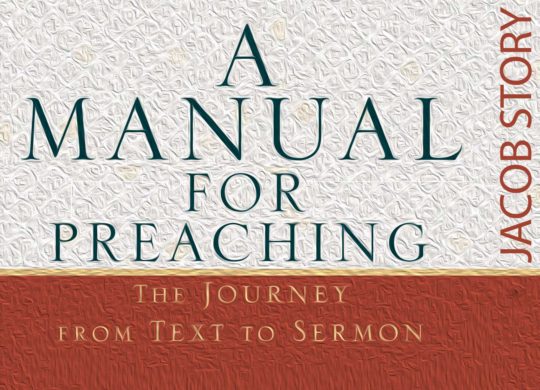Genesis 28:10–22

Jacob is on the run. In this pericope, his arrival at the “place” is apparently no accident: the verb paga‘ indicates that Jacob “encountered/struck” the place (Gen 28:11). Was it a divine “accident”? The narrator records what Jacob’s eyes see, with a threefold repeat of “behold!” (hinnehi, 28:12, 13, 15), escalating each time: “Behold, a ladder!” “Behold, the angels of God!” “Behold, Yahweh!” All this vividly emphasizes the transcendent nature of what was observed, an awe-inspiring scene as Jacob later confesses (28:17). It is a grand spectacle, with Yahweh, angels, and a stairway linking heaven and earth.
A grand divine appearance of God to Jacob.
[This narrative detail, being specific for the story’s circumstances, is not really “theological” in the sense of it going beyond the textual situation.]
The promises to Jacob are even more dramatic than the ones to his father and grandfather. At least Abraham and Isaac were married when these promises were bestowed, though childless. Jacob, on the other hand, is not even married, and yet he is promised numerous descendants through whom the world will be blessed. That God would be with the patriarch is guaranteed; that he would keep him wherever Jacob might go is pledged; and that Jacob would be returned to Canaan one day is assured. A series of six phrases with Yahweh as the subject reinforce the theme of his promise: “I am,” “I will keep,” “I will return,” “I will not leave,” “I have done,” “I have promised” (28:15); each time the object is Jacob.
A grand divine appearance of God to Jacob, and a grand divine promise from God to Jacob.
[Narrative detail.]
God’s guaranteed promises for the future.
Though Jacob acknowledges the transcendent vision he has just seen (28:16–18), his reciprocal vow is quite striking in its presumption and insolence: he is clearly not trusting God unreservedly. Notice, below, the line-by-line responses of the man to divine promises, in the form of “If you … [protasis], then I … [apodosis]” (the varying tenses in Jacob’s response—shown in brackets—validate this “if … then …” interpretation).
| God’s Promise (Gen 28:15) | Jacob’s Response (Gen 28:20–22) |
|---|---|
| PROTASIS [“If you …”] | |
| “I am with you” (28:15a) | “If God [will be] with me” (28:20b) |
| “and I will keep you” (28:15bα) | “and [if] he will keep me [perfect]” (28:20cα) |
| “wherever you go” (28:15bβ) | “on this way that I am going” (28:20cβ) |
| “and [if] he will give me [perfect] food … and garments” (28:20d) | |
| “and I will return you” (28:15cα) | “and [if] I return [perfect] in peace (28:21aα) |
| “to this land” (28:15cβ) | “to my father’s house” (28:21aβ) |
| “I shall not leave you” (28:15d) | |
| “and [if] Yahweh will be [perfect] God to me” (28:21b) | |
| APODOSIS [“Then I …”] | |
| “then this stone … will be [imperfect] God’s house” (28:22a) | |
| “and I will surely give a tenth [infinitive + imperfect] to you” (28:22b) |
Jacob demonstrates considerable hubris: he is obviously not taking God at his word. Even that clause in 28:21b appears to be laying down a condition for God to fulfill: “If Yahweh will be God to me.” He has just heard Yahweh identify himself as the “God of Abraham your father, and the God of Isaac” (28:13). Jacob is now demanding that this Yahweh be the “God of Jacob,” too. And, if that were not enough, he dares to add an extra condition: food and clothing (28:20d)! Not only does Jacob disregard land in favor of victuals and raiment, his demand focuses on himself: “give me” (28:20d), without any thought about posterity (the earlier portions of God’s promise, 28:14). Jacob’s interests seem far more parochial, insular, and self-serving. Not to mention his preoccupation with his own personal return “in peace” to his “father’s house” (implicitly confessing the lack of peace when he left home as a fugitive, 28:21a). God’s interests, on the other hand, are more farsighted and global—to return him to “this land,” the Promised Land (28:15c). In other words, Jacob is trading promises with God: if God kept his promises, then Jacob would keep his. The implication is that, instead of these insolent counter charges, Jacob should have worshiped God unconditionally respecting the future divine promises.
A grand divine appearance of God to Jacob, and a grand divine promise from God to Jacob, is responded to with distrust and wanting to manipulate God his own way (instead of worshiping God in gratitude).
[Narrative detail.]
God’s guaranteed promises for the future. Worship, trusting response [the positive version of a negative narrative].
A simpler, final construct:
God’s guaranteed promises for the future call for a response of trusting worship.












 Abe Kuruvilla is the Carl E. Bates Professor of Christian Preaching at The Southern Baptist Theological Seminary (Louisville, KY), and a dermatologist in private practice. His passion is to explore, explain, and exemplify preaching.
Abe Kuruvilla is the Carl E. Bates Professor of Christian Preaching at The Southern Baptist Theological Seminary (Louisville, KY), and a dermatologist in private practice. His passion is to explore, explain, and exemplify preaching.